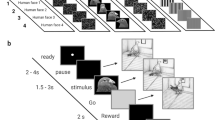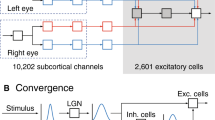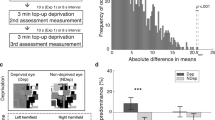Abstract
DESPITE the two hundred million years during which their evolutionary history was different from mammals, birds possess a central visual apparatus with surprising functional similarities to the striate cortex of cats and monkeys1. The visual Wulst2 of the owl contains neurones which can be binocularly activated and which show precise selectivity for the orientation, direction of movement and binocular disparity of moving straight line contours1, all characteristic properties of single neurones recorded from the striate cortex of cats and monkeys3,4. We were interested to determine whether binocular neurones in the owl's Wulst are also sensitive to visual experience in the neonatal period since another important characteristic of binocular neural connections in cat and monkey visuail cortex is their extreme sensitivity to monocular deprivation during the critical period5,6. The preliminary observations we present here, on young, monocularly-deprived owls, suggest that the functional parallel between the mammalian striate cortex and the avian Wulst extends to the phenomenon of plasticity as well.
This is a preview of subscription content, access via your institution
Access options
Subscribe to this journal
Receive 51 print issues and online access
$199.00 per year
only $3.90 per issue
Buy this article
- Purchase on Springer Link
- Instant access to full article PDF
Prices may be subject to local taxes which are calculated during checkout
Similar content being viewed by others
References
Pettigrew, J. D., and Konishi, M., Science, 193, 675–678 (1976).
Karten, H., Hodos, W., Nauta, W. J. H., and Revzin, A., J. comp. Neurol., 150, 253–278 (1973).
Hubel, D. H., and Wiesel, T. N., J. Physiol., Lond., 160, 106–154 (1962).
Hubel, D. H., and Wiesel, T. N., J. Physiol., Lond., 195, 215–243 (1968).
Wiesel, T. N., and Hubel, D. H., J. Neurophysiol., 26, 1003–1017 (1963).
Hubel, D. H., and Wiesel, T. N., J. Physiol., Lond., 208, 419–436 (1970).
Levick, W. R., Med. electron. biol. Engng., 10, 510–513 (1972).
Pettigrew, J. D., J. Physiol., Lond., 237, 49–74 (1974).
Barlow, H. B., Blakemore, C., and Pettigrew, J. D., J. Physiol., Lond., 193, 327–347 (1967).
Nikara, T. N., Bishop, P. O., and Pettigrew, J. D., Expl Brain Res., 6, 353–372 (1968).
Hubel, D. H., and Wiesel, T. N., Nature, 225, 41–42 (1970).
Sherman, S. M., Brain Res., 37, 187–204 (1972).
Steinbach, M. J., and Money, K. E., Vision Res., 13, 889–890 (1972).
Author information
Authors and Affiliations
Rights and permissions
About this article
Cite this article
PETTIGREW, J., KONISHI, M. Effect of monocular deprivation on binocular neurones in the owl's visual Wulst. Nature 264, 753–754 (1976). https://doi.org/10.1038/264753a0
Received:
Accepted:
Issue Date:
DOI: https://doi.org/10.1038/264753a0
This article is cited by
-
Visual categories and concepts in the avian brain
Animal Cognition (2023)
-
Connectivity between nidopallium caudolateral and visual pathways in color perception of zebra finches
Scientific Reports (2020)
-
Relative Wulst volume is correlated with orbit orientation and binocular visual field in birds
Journal of Comparative Physiology A (2008)
-
Imprinting modulates processing of visual information in the visual wulst of chicks
BMC Neuroscience (2006)
-
Two ears and two eyes
Nature (1993)
Comments
By submitting a comment you agree to abide by our Terms and Community Guidelines. If you find something abusive or that does not comply with our terms or guidelines please flag it as inappropriate.



